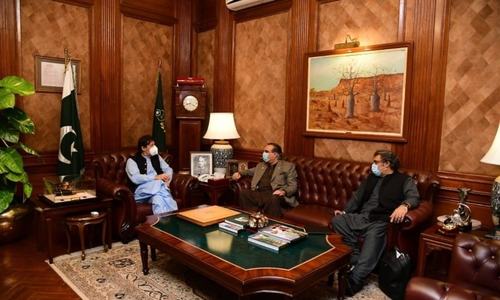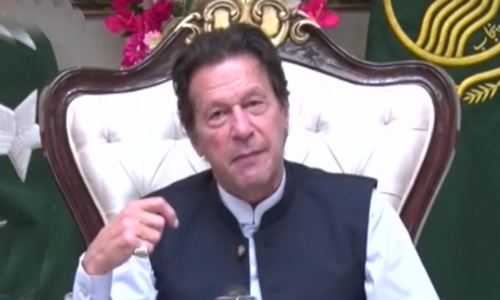Prime Minister Imran Khan on Wednesday said that the government had "no objection" to the 18th Amendment but that it was necessary to review some of its points that were "included in a hurry".
While addressing the media at the Governor's House, Karachi, he said that the Amendment had given provincial chief ministers "powers equivalent to dictators", but they did not devolve that power to local governments. "The system everywhere is based on three tiers but [in Pakistan] the system is two-tiered."
The premier is in Karachi for a two-day visit to Sindh — his first since the coronavirus outbreak began.
"I have clarified that devolution of power happens in societies where there is good governance. [The PPP government] included some things in the 18th Amendment in a hurry that need to be reviewed," he said. "One example is pollution — air and environment pollution affect all provinces. Medicines need to be standardised. They have done several things wrong."
The premier claimed that the local government system the PTI would bring in the next elections would be "the best in the world", adding that it was the PTI that devolved power and empowered village councils in Khyber Pakhtunkhwa, making it the first province to do so.
"We have held direct elections at the Tehsil level. The purpose for doing this is because we realised that a lot of corruption was done when elections was conducted through nazim. This is the system worldwide."
He added that the mayoral system was successful all over the world. "Karachi's problems cannot be solved unless direct elections happen. This system exists worldwide, I am not saying something new."
The premier said that there was an "anomaly" in the National Finance Commission (NFC), adding that 65 per cent was given to the provinces while there were allocations for defence and debt servicing as well.
"The federal government starts with Rs7 billion deficit budget, it is not feasible. This needs discussion and review. No budget in world is made with deficit."
'Pakistan only country to strike balance between saving economy, people'
The premier said that Pakistan was the only country to strike a balance between tackling the spread of the virus and saving the economy.
"Corona is international. Pakistan is thankfully saved. We would have reached our peak anyway because we can't [afford to] lockdown."
Citing the example of India, he said that they had to lift restrictions as people were dying of hunger and of the virus. "Pakistan is the only country to strike a balance between both [...] 34pc of the people in India went below the poverty line.
"Countries that have controlled the virus like Germany and Sweden, the people there followed standard operating procedures (SOPs)," he said, adding that strict action would now be taken against those violating the government's guidelines.
"We know where the hotpsots are and will enforce a smart lockdown in those areas."
He added that the federal government looked at national interest when proceeding against the Covid-19 outbreak. "We took the entire country's interests into consideration. We developed a system whereby the chief ministers and doctors of all the provinces could discuss the situation everyday."
On the contrary, he said that the Sindh government agreed on matters during the National Coordination Committee meetings and then "an hour later Chief Minister Murad Ali Shah would hold a press conference saying the opposite".
"Sindh did a very harsh lockdown at the start. In a country where 25 million people rely on daily wages, if you shut down, people will start dying of hunger. Nobody asked me [about the lockdown] and then other provinces followed suit.
"The result was that cars were being attacked and looted while passing through slum areas because people were hungry. So we started doing smart lockdowns because you can't shut all the people. We took all provinces on board. Murad Ali Shah agreed but then Bilawal said something else ... Bilawal Bhutto has no idea how poor people live."
The premier said there were no contradictions in any of his statements on the coronavirus outbreak, even when "governments across the world had changed their stance".
"They had consistency because we made the National Command and Operation Centre."
The premier added that there were two paths going forward. "If we follow SOPs, our hospitals will be able to cope [with the number of patients]. It will be difficult, but they will cope. But if we don't follow SOPs, our hospitals will buckle under the pressure."
Later, the premier tweeted that poverty and unemployment due to Covid-19 in Sindh was far greater than other provinces judging by the applications received by the PM's coronavirus relief fund.
"Thirty two per cent of all applicants are from Sindh whereas [the] population of Sindh comprises around 22pc of Pakistan's population."
During his visit to Larkana, the prime minister also observed that a large number of those unemployed were street vendors.
"I have asked the Sindh government to take this up with the CM as these poor people do not violate social distancing & their families survival depends on their daily income," he said.
'Pakistan cannot fight locust attack alone'
Speaking about the ongoing locust attack in different parts of the country, the prime minister said that "Pakistan could not fight the locust attack on its own". He said that the government was in contact with Iran as it was also affected.
He added that there were concerns that more swarms of locusts could arrive from the Horn of Africa or from India in July. "We hold meetings and discuss this. It is very unfortunate if politics is played on [this issue] like corona. We are making efforts but some things are not in our control. We are in constant contact with the Food and Agriculture Organisation (FAO)."
The premier said that the government had allocated resources to deal with the attacks "without considering [the different] responsibilities of the Centre and provinces". He added that the government had declared an emergency to deal with the locust attacks on January 31.
"Unfortunately all planes for locust spray from 1990s were old and dysfunctional," he acknowledged.
'PM visited to rub salt in our wounds', says Bilawal
Commenting on the premier's visit to Sindh, PPP Chairperson Bilawal Bhutto-Zardari said that the prime minister visited the province "six months after the first Covid-19 case was recorded in Karachi".
It is worth mentioning that the Pakistan's first two cases were reported on February 26.
In a tweet, he said: "PM select visited #Sindh 6 months after [first Covid-19] case was recorded in Karachi. Only to rub salt in the wounds of people of Sindh. Refused to do anything to save the people from infection or starvation. His budget robs our province of Rs229 billion during a pandemic!"
"His budget does not support our healthcare system under incredible strain from Covid. He has left our farmers exposed to locusts & economic ruin. Reduced BISP funding for the poor. Fires 10,000 steel mill workers. However, found Rs80 billion to fund a dam."
"[He] refused to meet anyone working on [the] frontlines fighting pandemic in our province. Not the doctors risking it all to save our lives. Not CM who’s leading the team. Would have been good for PM to meet. He could learn how we have highest recovery rate and testing rate of all provinces," he said.














































